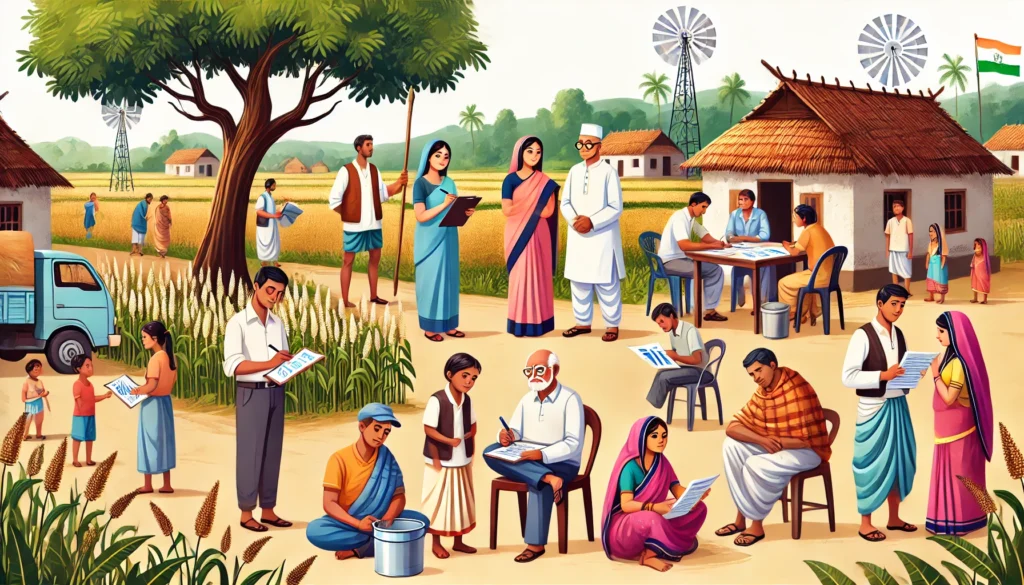
Elections like the Haryana assembly elections of 2024 have become extremely challenging to predict for several reasons. Let’s explore why these elections turn into nightmares for pollsters and analysts.
1. Small Sample Size
In a close election where the winning margin is as small as 1-2%, having a small sample size can lead to inaccurate survey results. A small sample may not represent the diversity of voters, especially when every vote counts. In such a tight race, a few unaccounted votes can significantly shift the result, making predictions unreliable. If survey organizations do not reach enough people or a wide variety of voters, they risk missing important insights. To overcome this challenge, it is essential to increase the sample size and ensure it represents every segment of the population. This helps in capturing a more accurate picture of voter preferences, particularly in tightly contested areas.
2. Silent Voters
Silent voters are those who do not openly express their voting preferences. These voters are tough to gauge because they might refuse to answer survey questions or might not be honest about their choices. Their behavior can be unpredictable, and they often decide their vote at the last minute. When exit polls fail to capture this group, the final prediction can be significantly off the mark. Silent voters can play a pivotal role, especially in constituencies where margins are narrow. Pollsters need to develop better methods to identify and understand silent voters, perhaps through indirect questioning techniques or by analyzing behavioral trends that could indicate their preferences.
3. Ever-Changing Local Dynamics
Local political dynamics are constantly shifting. Issues that mattered last month may have changed due to new developments, such as a local leader’s statement or a new government policy. Survey organizations often struggle to keep up with these changes and might not adapt their questions accordingly. This means the surveys could be outdated by the time they are conducted, failing to reflect the current situation accurately. To address this issue, surveys need to be more flexible and adaptive. Continuous monitoring of local events and integrating those changes into survey questions can help provide a more current and relevant analysis of voter behavior.
4. Lack of Stratification in Surveys
Stratification in surveys means dividing the voters into specific groups, such as by age, gender, caste, or region, to ensure that every segment is accurately represented. In many elections, there is a wide variety of voter groups, each with different priorities. If the surveys do not properly stratify these groups, they risk oversampling or undersampling some categories. This makes it impossible to apply a ratio to the entire population accurately, leading to faulty predictions. Proper stratification allows for a more precise representation of different voter segments, which is crucial in elections where diverse interests and identities play significant roles. Ensuring each group is adequately represented helps in minimizing errors and improving the reliability of predictions.
5. Pre-Occupied Bias and Influence of General Election Results
Another issue is the pre-occupied bias that some survey organizations might have. Many pollsters could be influenced by the results of recent general elections, leading them to assume similar patterns will repeat in state elections. But local elections are often very different from national ones. Local candidates, community issues, and regional alliances play a crucial role in state elections, which might not align with broader national trends. Assuming the same voting behavior can lead to incorrect predictions. Pollsters must treat each election as a unique event, taking into account the specific local factors that influence voter decisions, rather than relying on past trends from national elections.
6. Complexity of Regional Alliances and Candidate Popularity
Regional alliances and the popularity of individual candidates add further complexity to elections like these. Alliances can shift quickly, and voters may change their preferences based on the credibility and appeal of specific candidates. A candidate’s popularity might depend on factors such as their involvement in local community activities, their stance on regional issues, or even recent public appearances. When these factors are not adequately captured in surveys, predictions are bound to be inaccurate. Survey organizations need to closely monitor the dynamics of regional alliances and assess the personal appeal of candidates to understand their impact on voter preferences.
7. Influence of Social Media and Campaign Narratives
The role of social media in shaping public opinion has grown immensely. Campaign narratives can change within days, driven by social media trends, viral content, or public statements from influential personalities. These shifts can influence voter opinions in ways that are difficult to predict. Traditional surveys may not fully capture the rapidly evolving narratives fueled by social media. To improve accuracy, pollsters should incorporate social media sentiment analysis alongside traditional survey methods to gauge real-time voter attitudes.
These factors make elections like the Haryana assembly elections a complicated puzzle for psephologists. Accurately predicting the outcome requires more robust data collection, a greater understanding of local dynamics, and a careful approach to biases. Survey methods need to evolve to capture the nuances of voter behavior, including accounting for silent voters, adapting to changing local dynamics, and leveraging social media insights.

Kalyan Chandra
Kalyan chandra is a political strategist, media and communication consultant with the expertise in public relations, marketing, political research, election campaign management, psephology and digital analytics. He focuses on strategic political consulting, offering services that include competitive research, public opinion collection, and digital media management. Kalyan has significantly contributed to successful campaigns across India with his meticulous approach and deep understanding of the political landscape.
